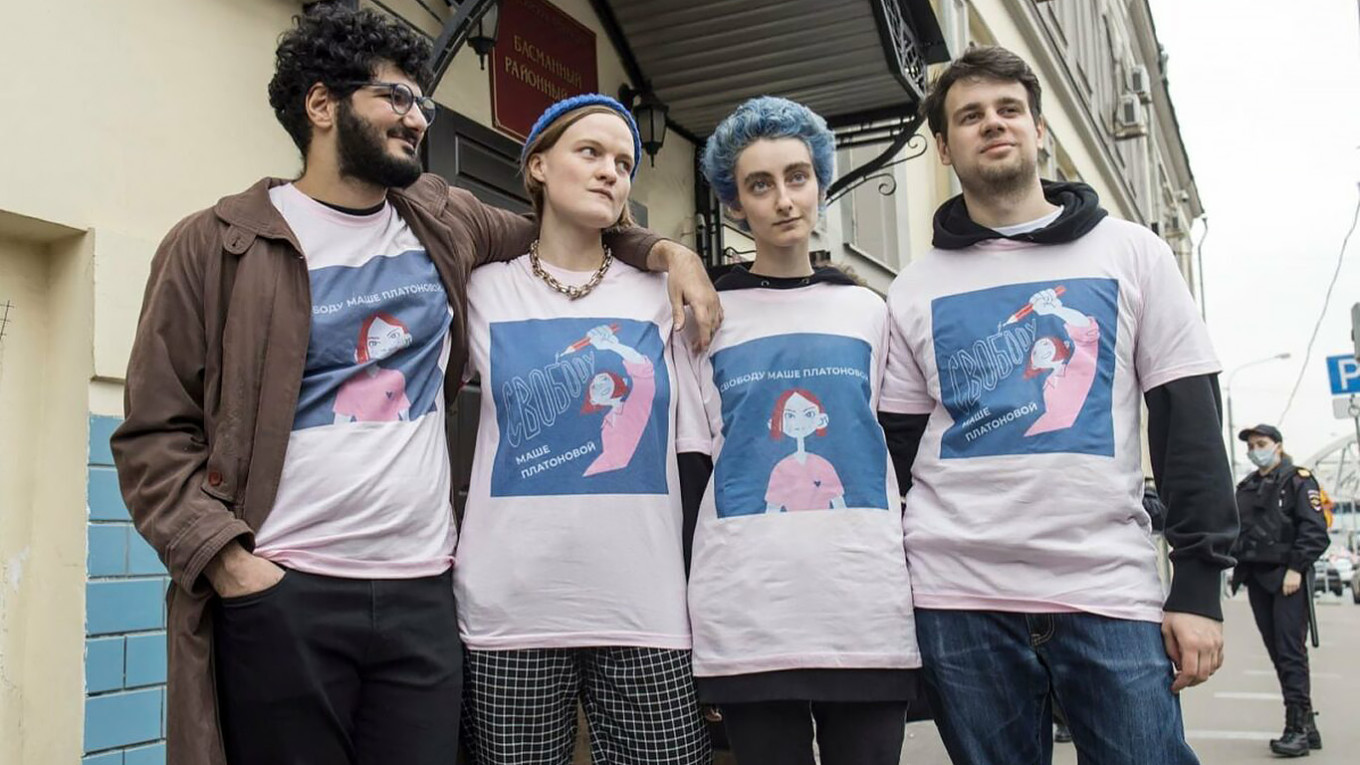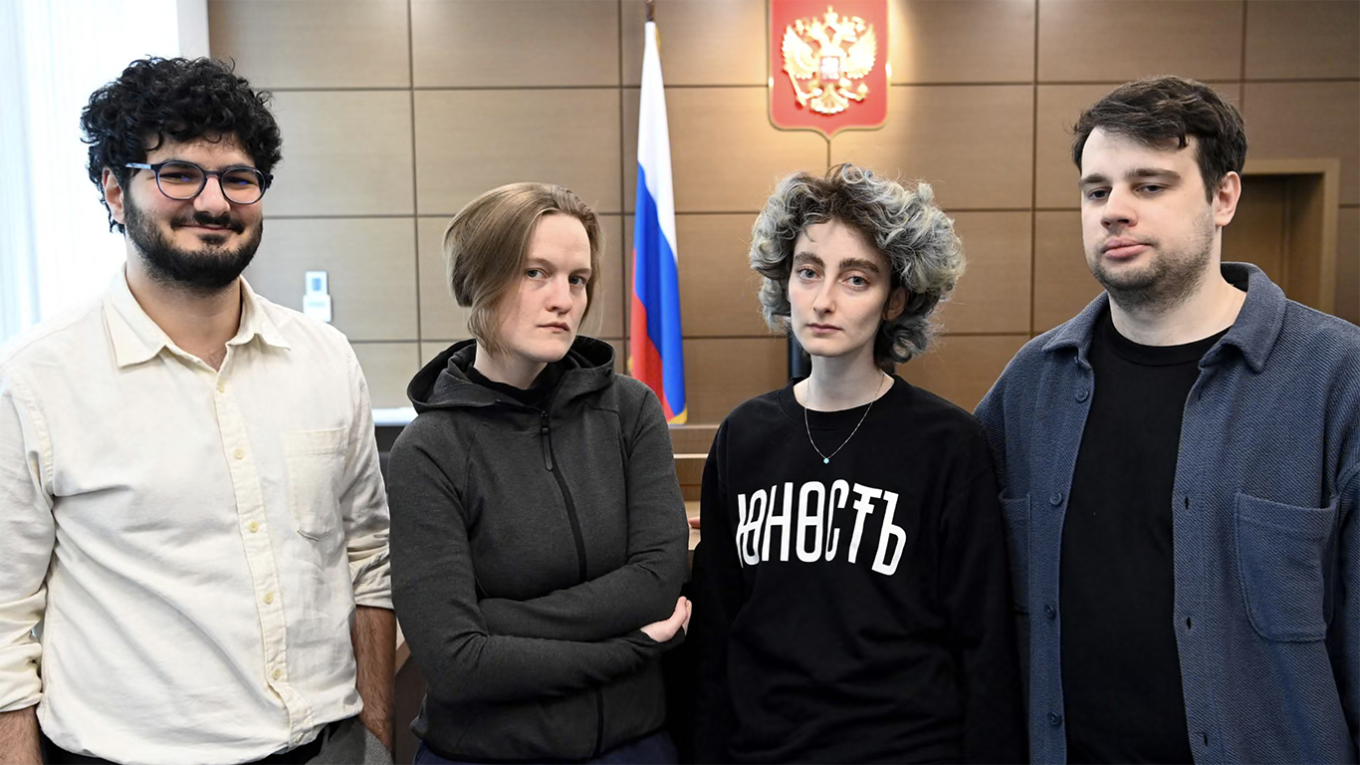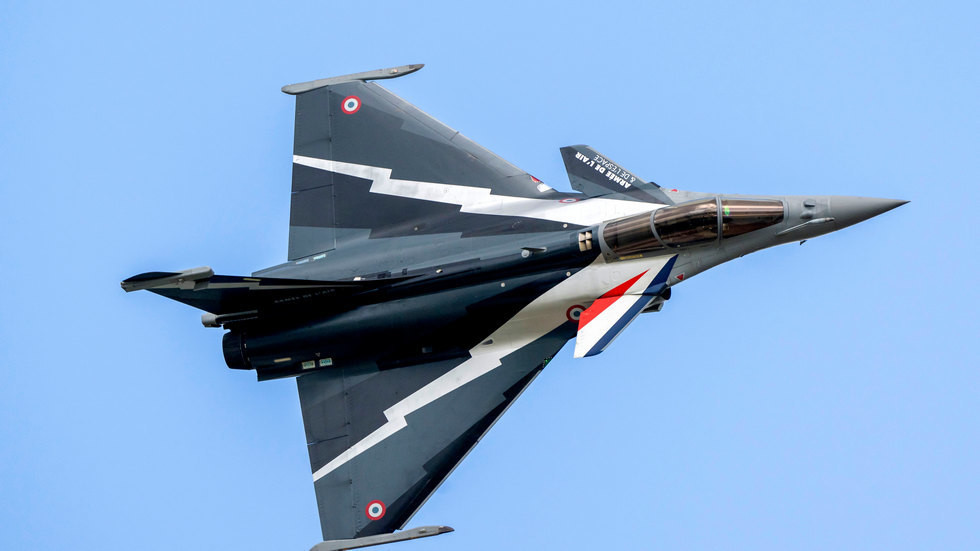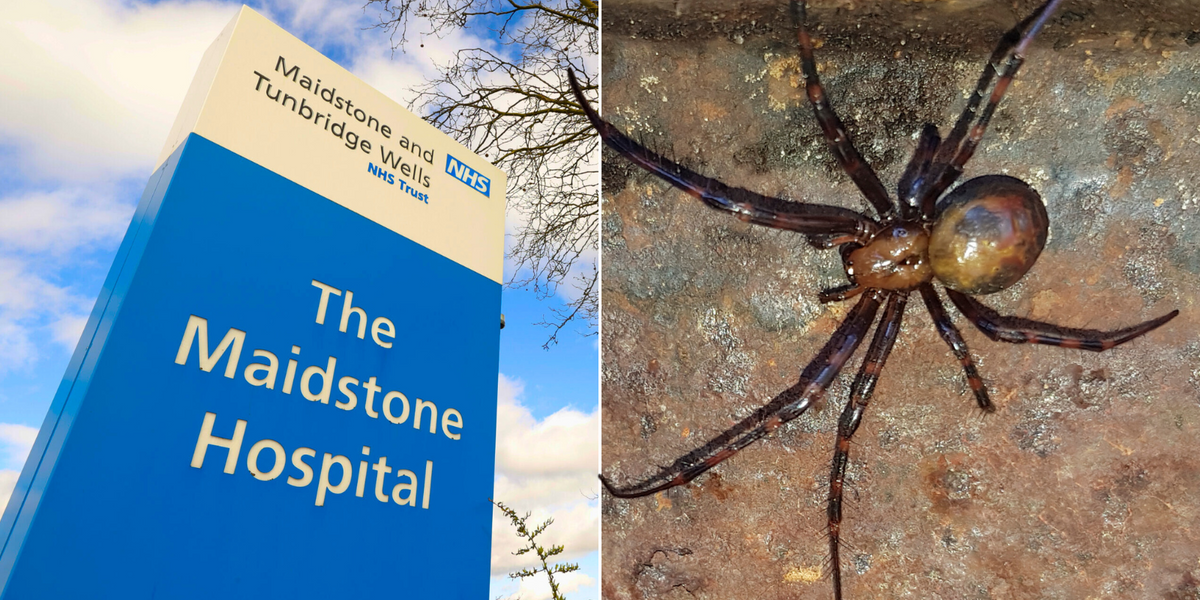LONDON — Alla Gutnikova’s story reflects Russia’s descent into repression in recent years.
As a university student, she became politically active while protesting in support of jailed journalist Ivan Golunov and protesters jailed for rallying for free elections in the summer of 2019.
Amid nationwide protests over Alexei Navalny’s arrest in 2021, Gutnikova and three fellow editors at the independent student magazine DOXA were arrested for a video defending students exercising their constitutional right to free assembly.
After nearly a year under house arrest, the DOXA editors were sentenced to two years of “corrective labor” in April 2022. They left Russia later that year as wartime repressions swept the country.
Now 26, Gutnikova is pursuing a master’s in contemporary literature at King’s College London. She continues to publish poetry and speak out on underreported issues in Russia, as well as against the invasion of Ukraine.
She spoke to The Moscow Times about her activism, DOXA’s criminal case and her difficult journey to freedom.
This interview has been edited for length and clarity.
The Moscow Times: What first got you into activism?
Alla Gutnikova: I got politicized, like a lot of people from my generation, in one exact summer. It started with the arrest of Ivan Golunov and continued with the ‘Moscow case.’ That was two years before my arrest — from this chronology, you can see how rapidly things evolved in Russia.
When [Golunov] was arrested, there was this huge campaign [for him] because he was a journalist. My fellow students and I went to the court to stand in the crowd, and I saw a lot of people I knew — journalists, writers, people from academia. We were all there, we were all shouting, and then a miracle happened: A few days later, he was released.
I think it might have set somewhat unrealistic expectations for me. It looked like if you go out to protest and you want him to be free, then he’ll go free. Later, there was a huge demonstration for the Moscow case, and I was also going to all the court hearings. They would release some of the political prisoners, and it wasn’t clear why some would go free and others would be sentenced to prison.
After that, it was impossible to stop. … I joined DOXA during the Covid lockdown. That was my path — from my first political action [in support of political prisoners] to being the one in the courtroom, now hearing the screams of people supporting me.
MT: There was a big support movement for you guys at your court hearings.
AG: It was a huge thing, and I’m very sad that it’s almost not an option anymore. A year ago, when Navalny was murdered, we could see that people used that day as the only possibility to express their [views], even just by going out with flowers, because that’s more or less the only day when they don’t arrest people. It was very important that back in our times, it was at least possible to express your political views that way.
MT: Are you still working with DOXA?
AG: I work as a freelancer; I’m a talking head for their videos. I’m very proud to be doing this work. Thanks to our criminal case, we have quite a huge audience now. … The videos that I work on are about mental health, homeless people, decolonization, the history of political prisoners. Unfortunately, I'm not a part of the team anymore. I had to quit because I needed a lot of time to recover my mental health.
MT: Some people might underestimate how house arrest can be a traumatic experience for someone. It's not going to prison, but it is its own form of...
AG: Masha Alyokhina from Pussy Riot has said that for her, house arrest was worse than prison because it’s a very sophisticated, very weird experience of being in and out at the same time. You’re not in prison, but you’re surrounded by some kind of glass or wall. You see people your age move on with their academic careers, fall in love, travel… They can come to visit you, but you still feel like you're an insect in amber. …
[The authorities] control your life, they make decisions about your life, and they can come to your apartment at any time. It has a very horrific effect on your mental health.
But I also had this double mindset about my house arrest. It was very traumatizing, and I know it’s repression, but I also know too much about how other people are tortured and treated [in prison]. I know that I was lucky in a way. When I have a chance to do a public talk, I always start with that: ‘I was under house arrest for a year, and I was lucky.’ Now, they don’t even put people under house arrest — you go straight to pre-trial jail.
 From left: Then-DOXA editors Armen Aramyan, Natalia Tyshkevich, Alla Gutnikova and Vladimir Metelkin outside Moscow's Basmanny District Court.
Courtesy photo
From left: Then-DOXA editors Armen Aramyan, Natalia Tyshkevich, Alla Gutnikova and Vladimir Metelkin outside Moscow's Basmanny District Court.
Courtesy photo
MT: I first heard about DOXA because they covered sexual abuse in universities. You’ve been outspoken about that as well, going public with your story of being abused by a final exam prep school founder.
AG: DOXA started as a student project, but it was always a left-wing project focusing on inequality, oppression and violence. When the problem of sexual harassment and abuse is a huge one, like the investigations into sexual harassment at schools and universities showed, it illustrates this system of oppression where those in power can do anything and will never face any punishment or restriction.
As a victim myself, I had the sexual assault that I survived in mind. Partly because of DOXA’s work, a couple of years later, I somehow decided that I’m now brave enough to be outspoken. It’s really important to feel that you’re not alone. … Sometimes someone will approach me and say, ‘Thank you for your brave act.’ It makes it easier for me to process my own trauma and be outspoken about it.
I feel that this is true about any violence or inequality: the more light we put on it, the easier it gets. I also spoke about that in my final court statement: that one has to call things by their names, that black is black and white is white.
Propaganda tries to convince you that black is white, or that you don’t have to believe your eyes, or you’re just crazy and it’s not happening — or that if something dreadful is happening, it’s happening for a higher reason or goal. But it’s not true.
MT: What is the situation like for young people in Russia now?
AG: Young people are famous for fighting for rights and freedoms. They’re not co-opted yet, they’re not ready to collaborate yet. They’re often very passionate, probably a little bit naive. I say this as a 26-year-old who is now a little more depressed and disappointed than I was, let’s say, 10 years ago. You don’t have that much to lose. You’re most likely to tell the truth and be out on the streets.
In our criminal case materials, there were interrogations of young people who were at the Navalny protests. A lot of them understood that it’s dangerous to tell the truth, so they would come up with a cover reason for being there … but a lot of them would say: ‘We think our government is criminal. We think that Navalny is innocent. We want him to be released.’ A lot of them spoke about corruption or poverty.
Now, there is no room for any political statement of any kind. You could be arrested for a private conversation if it’s overheard at a cafe if it’s anti-government or anti-war. You could be arrested for the clothes you’re wearing if it has the colors of the Ukrainian flag, for your posts on the internet, for being queer, for anything. You either have to go partisan and clandestine and underground, or you have to be silent. Or you need to be involved in volunteer projects, but also under risk, and preferably doing so anonymously.
People can’t really predict what’s going to get them arrested, so there’s still some kind of resistance, whether it’s cultural or projects on feminism or queerness, which is now also starting to be ‘extremist.’
It’s important to say that propaganda really affects education now, starting from kindergarten up to university. It’s hard because you need to teach your kids what is freedom, what is truth, what is justice, but then you need to teach them that they can’t say any of that if they’re not at home because they might get arrested. There’s the famous story of Masha Moskalyova. She drew a picture in support of Ukraine, and then she was separated from her father and her father was arrested. He’s just now been released.
MT: How have you used poetry to process your experiences?
AG: I was writing poetry before my arrest, but I started to publish it after the arrest. I thought there was something important that I needed to witness and to say. It was a way of resistance because you could live through something and then tell that story.
When it was time to say our last words [in court], it was after the full-scale invasion. I felt really cowardly because I was afraid to say the word ‘war’ — they were arresting people for this word. I felt like, ‘I’m too weak to go for a second criminal case, I can't do this anymore, I'm absolutely exhausted.’
I tried to write my statement as metaphorically, but as powerful as possible. I didn’t mention the word ‘war’ even once, but it was an anti-war statement. It somehow worked because it became quite well-shared and it was translated into 11 languages. When you’re writing something under censorship, it’s a very specific way. We also didn’t know if we were going to prison or not, so it might be your last free word. ...
Now the full-scale invasion has been going on for three years, and it’s obvious that propaganda is really strong. But during this first month, I had this false, naive idea that if only people knew, they would also fight for it to stop. That’s actually a Russian saying, ‘If only there would be no war’ — a lot of elderly people would say that. I was just too naive to think that we could change something.
 From left: Then-DOXA editors Armen Aramyan, Natalia Tyshkevich, Alla Gutnikova and Vladimir Metelkin during their trial.
Courtesy photo
From left: Then-DOXA editors Armen Aramyan, Natalia Tyshkevich, Alla Gutnikova and Vladimir Metelkin during their trial.
Courtesy photo
MT: Do you still feel it’s possible to change something? I mean, clearly in Russia, no, but is there any hope that things will change if we keep doing what we’re doing?
AG: I’m pretty sure we need to keep doing what we're doing, even if the answer is no. That’s just our moral obligation. … Even though it’s hard to feel it, I know for sure that dictatorships end, walls fall and prisons burn. There’s this book, ‘Everything Was Forever, Until It Was No More.’ It will be forever until it will be no more. We’ve seen the dictatorship in Syria fall, even though it felt like it would never be possible. Walter Benjamin in his famous ‘Theses on the Philosophy of History’ writes about the narrow gate through which the Messiah could enter any second.
But it won’t happen on its own. We need to be fighting, and there’s so much work to do. A lot of people are disappointed and depressed, and they want some kind of guidance. Even doing little things like supporting OVD-Info and human rights organizations — it’s not a lot, but it's the bare minimum that anyone should do.
It’s really important to research and to spread information about dictatorship. We need to document all of it because we know there are going to be trials. If we’re religious, we can think of a higher court. If not, we could just wait for the new Nuremberg. But definitely one day, it will happen. So we need — as journalists, as poets, as lawyers, as activists — to either document it, or try to do little acts. There are a lot of activists who literally save lives. It sounds impossible now, but they still do.
A Message from The Moscow Times:
Dear readers,
We are facing unprecedented challenges. Russia's Prosecutor General's Office has designated The Moscow Times as an "undesirable" organization, criminalizing our work and putting our staff at risk of prosecution. This follows our earlier unjust labeling as a "foreign agent."
These actions are direct attempts to silence independent journalism in Russia. The authorities claim our work "discredits the decisions of the Russian leadership." We see things differently: we strive to provide accurate, unbiased reporting on Russia.
We, the journalists of The Moscow Times, refuse to be silenced. But to continue our work, we need your help.
Your support, no matter how small, makes a world of difference. If you can, please support us monthly starting from just $2. It's quick to set up, and every contribution makes a significant impact.
By supporting The Moscow Times, you're defending open, independent journalism in the face of repression. Thank you for standing with us.
Continue
![]()
Not ready to support today?
Remind me later.

 By The Moscow Times | Created at 2025-03-28 11:45:18 | Updated at 2025-03-31 08:12:58
2 days ago
By The Moscow Times | Created at 2025-03-28 11:45:18 | Updated at 2025-03-31 08:12:58
2 days ago








